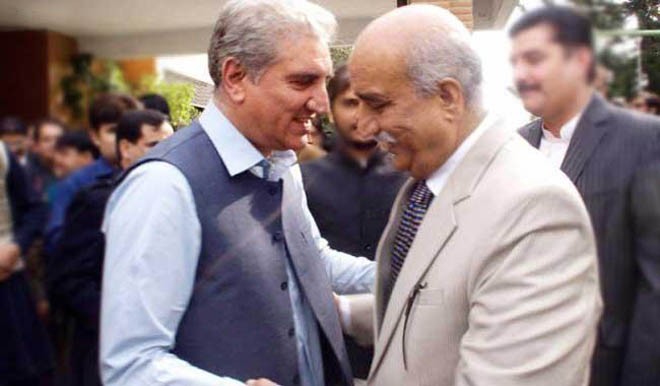
Debate over the formation of a commission to probe the leaks doesn’t seem to be dying down

Hardly a year after the controversy over the rigging in the 2013 polls, Prime Minister Nawaz Sharif finds himself again in another political turmoil.
His opponents are seeking a probe into allegations that his family has stashed billions of rupees of public money in offshore companies in Panama.
Panama Papers have opened the floodgates of controversy for the third-time elected prime minister whose government is already fighting on many fronts.
Nawaz Sharif appeared on the state television to announce the formation of a judicial/inquiry commission headed by retired judges of the apex court to investigate the involvement of his family.
The division between the opposition political parties has further undermined the prospects of the proposed inquiry commission. Leader of Pakistan Tehreek-e-Insaf, Imran Khan, has demanded the formation of a judicial commission headed by serving Chief Justice Anwar Zaheer Jamali while Pakistan People’s Party wants an independent forensic audit to probe the leaks.
Experts believe the National Accountability Bureau (NAB), Federal Investigation Agency (FIA), Federal Board of Revenue (FBR) and State Bank of Pakistan (SBP) should be the investigative agencies which are legally mandated to investigate such matters.
The superior judiciary, in the light of the commission’s investigation, should determine whether the offence is sufficient to warrant sentence or not, they say. In their opinion, NAB, FIA, FBR and SBP should then present their findings to the judicial commission, possibly to be formed by the top judge of the Supreme Court, either comprising serving or retired judges of the apex court.
Once formed, the government ought to empower the commission to hire the services of an international expert on forensic audit, if required.
The commission should focus on offshore companies’ funds either transferred from Pakistani or foreign entity through legal means. Did these funds have SBP approval; experts say this would be the basic question for investigators.
There could be a special investigation team, inquiry commission, or judicial commission to probe the leaks, observes senior lawyer Babar Sattar. "Formation of any inquiry commission is usually made under the Pakistan Commissions Inquiry Act, 1956," he said.
The head of this commission under this act can decide the terms of reference for the commission, which can summon any citizen as witness and record from any department to probe the allegations. "Government departments are under obligation to obey the orders of the commission," says Sattar.
He also suggests that the parliament should also come up with fresh legislation to deal with "white-collar corruption, laundered money and hidden assets abroad."
Irfan Qadir, former prosecutor general NAB, says it is a case for NAB after many people have admitted to having offshore business companies abroad. Under section 9 of NAB Ordinance 1999, the authority can investigate any person who owns property, directly or indirectly, both within Pakistan or abroad, if anyone questions it. "The NAB is duty bound under Section 18 of its Ordinance to take notice of the reported Panama Papers Leaks," adds Qadir.
"What happened to the Abbotabad Commission, Memo Commission, Ogra and Ephedrine Scams, which involved sitting prime ministers?" he asks "If this commission or committee is formed by a sitting prime minister then I fear no productive result will come," he says.
According to experts, the proposed commission can have the following terms of references (ToRs).
I) How did Hassan Nawaz and Hussain Nawaz build billions of rupees worth of property when they were too young?
II) Did their parents hold public offices when they bought properties abroad?
III) Hire international audit firms to probe all ventures, assets and money trail in this case.
IV) Forensic audit of all offshore companies Pakistanis own abroad.
V) Did someone attempt to evade taxes, particularly whose names were mentioned in owning offshore companies?
VI) Was the property maintained through companies abroad declared or concealed in their assets as required by Federal Board of Revenue or the Election Commission of Pakistan?
VII) Was the prime minister liable to be disqualified on any violation if it’s found during inquiry?
The intelligence unit of IB can also facilitate the commission by questioning those who have been involved in establishing offshore companies. "The commission can take complete assistance from forensic experts, audit experts, top tax experts, intelligence persons as well as experts of international law to probe the leaks within weeks," says Qadir.
Aitzaz Ahsan, a senior PPP leader, says the government should seek assistance of the United Nations under its "Stolen Asset Recovery Initiative, to probe hidden assets of Pakistanis, to prevent the laundering of the proceeds of corruption and timely return of stolen assets. An independent audit firm can also be hired to conduct fair audit of offshore companies, either owned by politicians or businessmen."
"In this particular case what we need to understand first is that this is how global capitalism and its local allies work," observes Harris Khalique, a political commentator.
"Politicians may find legal cover as well because the world is run by the rich and works for the rich. Therefore, I see it more of an ethical issue than a legal issue," he says.
Kamran Rehmat, former Editor The News, says it’s a complicated hunt. "Almost everyone’s mantra appears to be a judicial commission. While it sounds good on paper. There’s not much it can whittle down to in the absence of a forensic audit. Make no mistake, without the wizards trailing the footprint; there isn’t half a chance at solving the jigsaw puzzle. And then, too, if all the cards fall into place."